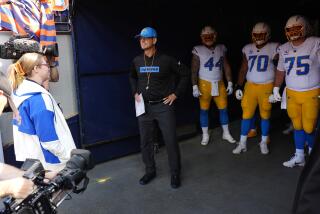Black coaches? The NFL drops the ball
- Share via
THIS YEAR marks the 20th anniversary of former Los Angeles Dodgers General Manager Al Campanis’ infamous statement that African Americans “may not have some of the necessities” to effectively manage a team. The outcomes of two games in the National Football League last Sunday should have helped bury for good Campanis’ view. But the world of professional football truly stands apart. In comparison with other professional sports, the NFL’s progress in diversifying its coaching ranks has been glacial, and the league’s executive suites are all but closed to African Americans.
There is much to cheer in the ascent of Tony Dungy of the Indianapolis Colts and Lovie Smith of the Chicago Bears, the first black head coaches to compete in the Super Bowl. Not only have they “blazed a new trail,” as the media have breathlessly reported, by leading their teams to their sport’s premiere showdown, Dungy and Smith don’t come from the Bobby Knight school of coaching that puts a premium on humiliating athletes and engaging in histrionics to get the most out of a team. They treat their charges like adults -- not millionaire juvenile delinquents -- and their players respond with unusual loyalty.
But the success of Dungy and Smith should not obscure a painfully obvious truth. In the world of football, both the professional variety in the NFL and the semi-pro in the National Collegiate Athletic Assn., Campanis’ view continues to rule.
About 70% of the players in the NFL are black, but out of the league’s 32 teams, only six African Americans are head coaches. The situation is worse in the executive box -- three black general managers. As poor a record as this is, black representation in the ranks of college football coaches makes the NFL coaching fraternity look like the Harlem Globetrotters. Only six of 117 NCAA head football coaches are African American, according to the Black Coaches Assn.
It’s not that black coaches in the NFL don’t win at the same rate as their white counterparts. The first African American head coach in the NFL was Art Shell, who was hired in 1990 by the then-Los Angeles Raiders. He and the seven other blacks who have coached in the NFL’s modern era have a combined winning percentage of .546 and have made the playoffs in 29 of their 50 combined seasons. Dungy is the only NFL coach to have led a team to the playoffs seven consecutive years, and Smith last year took his Bears, predicted to finish last in the entire league, to the playoffs, a feat that won him Coach of the Year honors.
The recent increase in black coaches in the NFL owes much to “the Rooney rule” (named after the idea’s patron, Pittsburgh Steelers owner Dan Rooney), which compels owners to interview black candidates for coaching jobs. (Rooney practices what he preaches: He just hired Mike Tomlin, an African American, as the Steelers’ new head coach.) The Rooney rule was implemented in 2002, after the late Johnnie Cochran and Cyrus Mehri pressed an antidiscrimination suit against the NFL, which at the time had only two black head coaches.
As columnist Bomani Jones wrote for ESPN.com, “There is nothing worth celebrating about a league that has to force its franchises to interview nonwhite coaching candidates and finally has a black coach in the 41st edition of its biggest game. That’s not a good thing. That’s a damn shame.”
Black representation in the upper ranks of this country’s two other main professional sports is not an aberration. The first African American head coach in the National Basketball Assn. was legendary center Bill Russell, who was hired in 1966 by the Boston Celtics as player-coach to replace Red Auerbach. Currently, 11 of 30 NBA coaches are black in a league that is 75% African American. There are also eight African American general managers and one owner, the Charlotte Bobcats’ Bob Johnson.
Major League Baseball hired its first African American manager in 1975, when Frank Robinson took the helm of the Cleveland Indians. Today, there are only two black managers, but this partly reflects the dwindling African American presence in baseball. Only 8.9% of players are black, and several teams have no African Americans on their roster. The league now spends more energy and resources developing talent on the cheap at their baseball academies in Latin America. As a result, the demand for bilingual managers of Latino descent has greatly increased. Five men currently meet that description.
This year also marks the 60th anniversary of Jackie Robinson breaking the color line in Major League Baseball. After retiring, Robinson was asked to play in an old-timers’ game at Yankee Stadium. He refused, saying, “I must sorrowfully refuse until I see more progress being made off the playing field on the coaching lines and in the managerial departments.”
Robinson’s concerns certainly apply to the NFL. Regrettably, if the history of sports tells us anything, owners of professional teams will only be dragged toward diversifying their managerial ranks if players demand change by publicly expressing their desire to have the best possible head coaches.
The amplified applause that accompanies Dungy’s and Smith’s achievements should not distract us from the reality that this is still not the case.
More to Read
Go beyond the scoreboard
Get the latest on L.A.'s teams in the daily Sports Report newsletter.
You may occasionally receive promotional content from the Los Angeles Times.










